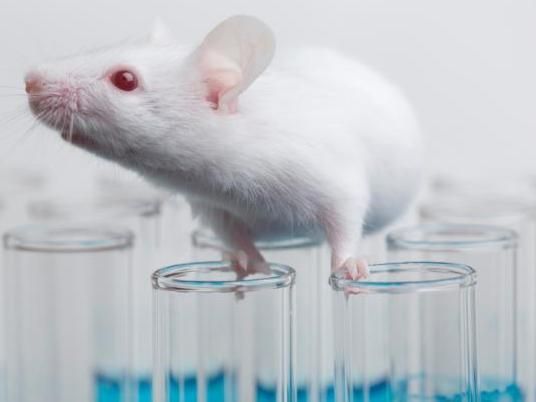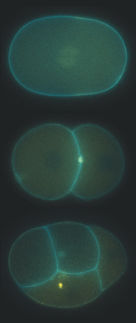Autoimmune diseases gonna be defeated
Advertisement
An international team of scientists led by the Lomonosov Moscow State University group made a significant step in creating a new type of drug for treatment of autoimmune diseases, such as rheumatoid arthritis and Crohn's diseaase. The work was published in PNAS.

In experiments with mice a novel approach to anti-cytokine therapy was scientifically proven. This approach allows to neutralize the bad function of a molecule, retaining the good one.
LMSU
Scientists from Russia, Germany and Great Britain designed and developed a prototype of a new antibody-based drug for autoimmune diseases. The key role in this research was played by the scientists from MSU and Russian Academy of Sciences. The study was led by Sergei Nedospasov, the head of the Immunology Department of Biological faculty, MSU, and the Molecular Immunology Department, A.N. Belozersky Institute of Physic-Chemical Biology of MSU. He said that the experiments with mice provided a scientific basis for the new approach, allowing to selectively counteract deleterious functions of one of cytokines that may provoke serious diseases, while retaining its beneficial functions (such as control of tuberculosis).
In corpora sano
Each of us has a personal army of immune cells protecting their health: valorous macrophages, brave T-killers, vigilant T-helpers, teachable B-lymphocytes and other invisible (without a microscope) fighters.
The immune system is very complex and depends on a harmonious collaboration of all its parts. That is natural, as this system should defend us not only from the external threats (pathogenic bacteria, viruses, fungi, parasites), but also from the inside enemies (malfunctioning cells of our own body, 'sabotaging' its regular tasks).
Some of the immune cells may 'overwork' and instead of a protecting us they may turn in repressive mechanisms, resulting in autoimmune diseases.
Among such diseases are systemic lupus erythematosus, rheumatoid arthritis, multiple sclerosis, Crohn's disease (a chronic inflammatory bowel disease) and psoriasis. In the new study scientists learned how to selectively block overproduction of TNF -- a protein, secreted by the immune cells for fighting diseases, but harmful when overproduced. TNF is blocked only on particular type of cells, and this that does not harm its other functions.
TNF: the good, the bad and the ugly
One of the immune system mediators, TNF (Tumornecrosisfactor), is a protein with a multiple functions. It can be secreted by macrophages, lymphocytes, neutrophils and other immune cells.
TNF and its related molecules belong to the cytokines. That is a group of small proteins, some of which can promote inflammation, some other counterbalance tumor formation, some are used to fight viral and bacterial infections, but all of them regulate the activity of the immune system.
Initially TN? was detected during experiments with blood serum of the mice that undergone a bacterial infection, or received bacterial components. It was found that transfer of such serum( orpure TNF protein) into tumor-bearing promotes tumor destruction, and that seemed to open a promising way for fighting cancer: you only need to launch the synthesis of large TNF quantities - and the malignant cells would start to die out. Apart from that, another 'good' function of that protein was uncovered: it helps protecting organism against TB.
But as many other multifunctional proteins, TNF has its dark side: it may turn to 'the bad' and promote serious diseases. Such 'bad' TNF needs to be neutralized.
Animmune uroboros
So, the hopes for cancer cure by TNF proved baseless: it turned out that this protein influences too may processes to be administered in a human body as a drug. Moreover, its physiologic function is quite different from tumor necrosis. That cytokine could be more properly named interleukin-x, but nobody wanted to rename TNF.
For the same reason the idea of a controlled overproduction of this cytokine in a human body was rejected. Furthermore, in order to treat some autoimmune diseases TNF should be inhibited. Such drugs are making about a half of the market for treatments of rheumatoid arthritis, psoriasis, Crohn's disease and some other diseases (tens of billions of dollars per year!). However, dramatic side-effects may take place, for example, increased risk of malignancies and activation of a latent TB infection, because apart from 'the bad' TNF there is also 'the good' one in the body, that should better not be blocked.
Nothing to change but the chains: bispecific antibodies.
Each B-lymphocyte produces against a particular antigen only one antibody type consisting of two pairs of heavy and light chains. Though scientists learned long time ago to produce artificial, 'chimeric' antibodies that are able to stick to two proteins simultaneously with various Fab-fragments. Such antibodies are called bispecific. One of its advantages - a possibility to connect different cells using such an antibody - this was already used to produce effective cure for several kinds of tumors. In antibody bioengineering field, a particular type of antibodies from camel, lama or shark, which contain only heavy chains, can be used.
Scientists of the Immunology Department of Biological faculty, MSU, and Engelhardt Institute of Molecular Biology of the Russian Academy of Sciences designed, created and evaluated bispecific antibodies able to selectively inhibit TNF on a certain type of cells (macrophages), that produces mostly 'the bad' TNF in autoimmune diseases, without harming the function of 'the good' TNF.
'This work lasted nearly ten years. The article describes only the tip of the iceberg,' - comments the author of the study, Sergei Nedospasov. In our bi-specific antibodies one antigen was TNF itself, the other was a molecule from macrophage surface, called F4/80.
'In experiments with mice a novel approach to anti-cytokine therapy was scientifically proven. This approach allows to neutralize the bad function of a molecule, retaining the good one. The main conclusion is that selective pharmacologic blockade of the immune mediator - cytokine - is possible on a particular type of producing cells,' - says Sergei Nedospasov.
A new type of bispecific antibodies was called MYSTI (Myeloid-Specific TNF Inhibitor). They were designed using antibody 'modules' from camels and lamas.
For this study immunologists first created a novel mouse with its TNF gene replaced with a human counterpart (the so-called humanized mice) with a purpose to gain a more realistic model for further research. After treating such mice with bispecific antibodies TNF produced by macrophages was not secreted but remained attached to their surface, this was shown in macrophage culture prepared from humanized mice. Experiment was then extended to live humanized mice to prevent septic shock provoked by 'the bad' TNF from microphages. It turned out that at certain dose MYSTI protected mice from a lethal toxicity, while a control antibody did not.
'Basedon these results pharmaceutical industry may design and test some brand-new drugs for treating autoimmune diseases,' -- Sergei Nedospasov optimistically prognoses.




























































